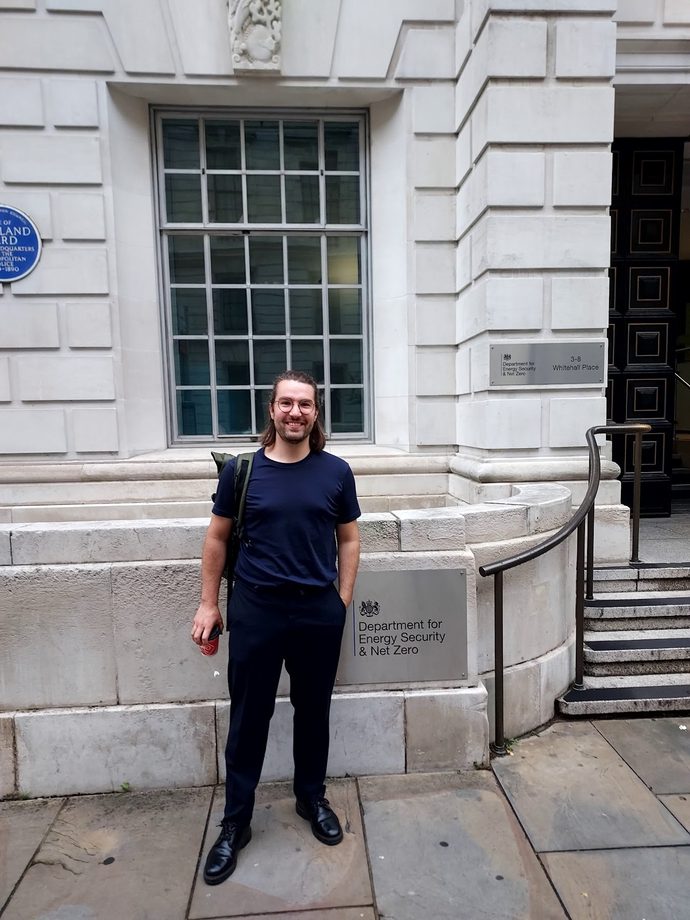- 12-month project aims to fill evidence gaps ahead of the UK Government setting its Seventh Carbon Budget;
- Partnered with the Department for Energy Security and Net Zero (DESNZ), researchers look to deliver rapid analysis to influence legally-binding, 2038-42 document;
- Work underway, with 120 attending a gathering to kick off Sprint in Whitehall.
A 'Sprint' project to fill evidence gaps in macroeconomic and distributional analysis, needed for the UK Government to set its Seventh Carbon Budget next year, has got underway at INET Oxford over the summer.
Led by the Complexity Economics Director J. Doyne Farmer, managed and initiated by Tom Youngman, and partnered with the Department for Energy Security and Net Zero (DESNZ), Macroeconomics of the Seventh Carbon Budget will see a team undertake a 12-month intense research effort with the aim of providing provisional analysis in time to influence the legally-binding Seventh Carbon Budget, set next year for the 2038-42 period.
The Sprint, which is funded by The Agile Initiative at the Oxford Martin School, will enable macroeconomic and inequality goals to be taken into account when the Government decides how emissions reductions are allocated between sectors of the economy, and how individual mitigation policies in the Carbon Budget Delivery Plan are implemented.
It is driven by experts in Agent-Based Modelling from the Complexity Economics Programme at INET Oxford, also including Emilien Ravigné, Jordan Kemp, Brendon Tankwa and Benjamin Wagenvoort.
The Sprint is expected to run from July 2025-June 2026 and work kicked off on 24 July 2025, with a seminar led by Dr Ravigné in Whitehall attended by 120 members of DESNZ. Further seminars from team members Brendon Tankwa and Benjamin Wagenwoort have followed during the summer months.
Background: Carbon Budgets and New Modelling Approaches
In 2026, the UK government will decide on its Seventh Carbon Budget, covering the years 2038 to 2042. Carbon budgets are five-year carbon emissions limits set by the UK Government, 12 years in advance. The UK is aiming for ‘net zero’ carbon emissions by 2050.
Policies recommended by the Climate Change Committee (CCC) require widespread social change, additional investment of around 1% of GDP, and major changes in practices and technologies within many industries (CCC, 2025). To successfully navigate such major changes, the Department for Energy Security and Net Zero (DESNZ) have identified macroeconomic and distributional analysis as evidence gaps they must address to set the Seventh Carbon Budget.
In this Sprint the team aims to develop new modelling approaches to fill those evidence gaps. The models will assess macroeconomic impacts of carbon budgets, including the impact on people with different levels of income and wealth. Methods will be designed so as to be readily transferrable to other countries and regions.
Data-driven macroeconomic agent-based models have the characteristics required to model carbon budgets’ macroeconomic and inequality impacts. These models use real socioeconomic survey data to simulate the interactions of households, firms, government and the financial sector. This realism allows very specific policy interventions, in contrast to most macroeconomic climate modelling that flattens all policies into a carbon tax equivalent. This class of model is in its infancy but has already demonstrated the potential to rival the forecasting performance of DSGE* models (Poledna et al., 2023).
The Complexity Economics team at INET Oxford has developed a prototype model that covers all OECD countries (Wiese et al., 2024). As the model outputs individual income and wealth balance sheets for each of the thousands or millions of agents represented in each time period, it has great potential to conduct dynamic analyses of the distributional impacts of policy over time.
* Dynamic Stochastic General Equilibrium models
Collaboration between researchers and government 'a dream'
Project manager Tom Youngman of the Complexity Economics Programme at INET Oxford, said that the team had got off to a strong start:
“We have brought together an interdisciplinary team with just the skills DESNZ needs to make a macroeconomic and distributional assessment of the Seventh Carbon Budget. Our research will take a whole economy view of Net Zero, asking which low carbon investments and policies will have the best long term impact on employment, inequality and growth.”
“This sort of open, responsive collaboration between researchers and government is exactly what I dreamed of facilitating when I came to INET from the Government Economic Service. I strongly believe that INET’s new economic thinking can make a major contribution to key UK policy challenges, and I am delighted that the Oxford Agile Initiative has made this collaboration possible” he said.

What are Sprints?
The Agile Initiative responds to specific environmental policy questions with fast-paced solution-focused research that delivers new research precisely when it is needed. World-leading academic teams from across Oxford work closely with policy, industry, NGO and local collaborators to feed evidence-based responses to a single, key question into the policy cycle in real-time. These are ‘Sprints’.
Sprints offer a faster, more collaborative way of conducting research that breaks down the barriers between stakeholders and brings varied scientific disciplines together to deliver the best possible policy solutions to critical environmental challenges.








